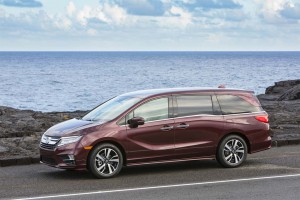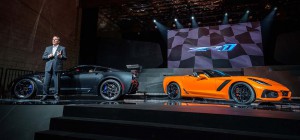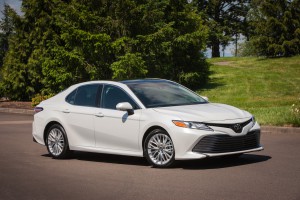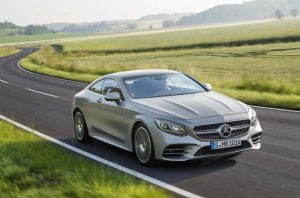
Every single car, truck or crossover sold in the U.S. would be affected by the 25% import tariff being proposed by Pres. Donald Trump, with prices on some models rising by tens of thousands of dollars.
That’s because even vehicles assembled in the U.S. rely on some level of imported parts and components, whether in their suspension, infotainment systems or powertrains.

Complicating matters, American-made auto parts and vehicles could become more expensive, and lose their competitive edge, if trade partners enact their own tariffs in response, something a number of them have now threatened to do.
(Auto tariffs getting a global pushback. Click Here for the latest.)
Perhaps surprisingly, some of the manufacturers that could be hit hardest by tariffs are the ones based in Detroit. Since the 1980s, when they opened up their first assembly plants in the U.S., Japanese automakers have established extensive manufacturing bases in the States that could limit how hard they will be hit by any new tariffs.

According to a study released last month by Cars.com, the Jeep Cherokee was the “most American” vehicle sold on the U.S. market, but Honda’s Odyssey minivan and Ridgeline pickup – both assembled in Lincoln, Alabama – were close behind, with about three-quarters of their parts and components sourced from the U.S. Close behind were such “imports” as the Honda Pilot, and Acura MDX , with more than 70% U.S. componentry. In all, about half of the website’s top 10 “American” vehicles are made by foreign brands.
There’s some debate over the metrics used to determine what counts as American-made, however, and by the definition used by the U.S. Commerce Department, Detroit brands fare even more poorly, with their highest-ranked model, the Chevrolet Corvette, placing seventh.
At the very least, about 25% of the parts used in American-made vehicles come from outside the U.S., and on some vehicles the figure rises to more than half.
(Trump threatens Harley-Davidson with new “huge” tax if it moves production abroad. Click Here for the story.)

The higher the import parts content, meanwhile, the more the vehicle’s sticker price will rise. Toyota assembles the Camry sedan – which was the sixth best-selling vehicle in the U.S. last year – in Georgetown, Kentucky. The automaker has estimated it will have to raise Camry’s MSRP an average $1,800 if the tariffs are enacted.
Collectively, Japanese automakers claim to have invested $48 billion in U.S. manufacturing facilities. Those factories currently assemble more than 80% of the vehicles Toyota, Nissan and Honda sell here. Subaru also operates a U.S. plant, as do Korean carmakers Hyundai and Kia. So do Mercedes-Benz and BMW, and their assembly plants are two of the largest exporters of American-made vehicles.
Many of those foreign-owned plants could face a double-whammy if import tariffs are enacted: prices will rise because they use at least some foreign-made parts, and their exports could tumble if trade partners enact their own import restrictions. BMW has already warned it may have to reduce investments in its Spartanburg, South Carolina factory – reducing production and jobs – if Trump’s tariffs are enacted.
Detroit automakers are far from immune, as General Motors this week warned in a letter to the Commerce Department, which the president has ordered to investigate whether auto imports pose a threat to national security.

“Increased import tariffs could lead to a smaller G.M., a reduced presence at home and abroad for this iconic American company, and risk less — not more — U.S. jobs,” the automaker warned.
Of all auto manufacturers, only Tesla currently assembled all of its vehicles in the United States, but half of its components are believed to come from abroad.
According to some recent studies, the typical vehicle sold in the U.S. could see prices jump by $5,800 with 25% tariffs. That number is slightly skewed by the fact that many of the highest-priced vehicles in American showrooms are assembled abroad. But even a vehicle like the Honda Civic, assembled in Ohio, could wind up costing several thousand dollars more.
(Click Here to see how “nearly every segment of auto industry” is threatened by Trump trade tactics.)
Any increase in new vehicle pricing will hit at a bad moment. The U.S. market slipped last year for the first time since the industry hit bottom in 2010. And while sales have been on a bit of a roller-coaster in recent months, 2018 is expected to see another dip under the best of circumstances. Rising interest rates, authorized by the Federal Reserve, certainly aren’t helping, and tariff-related price hikes are widely expected to deliver a hammer blow, potentially leading to a decline of anywhere from 1 million to 2 million vehicles, according to a report by the American Automotive Policy Council.








One could come to the conclusion that the Tariff wasn’t planned with reality in mind?
Trade wars are easy to win. These tariffs are the best. Everyone says so. All these naysayers are just sour grapes. Sad!
Hi, Paul, a massive bit of irony on your part. Obviously, anyone with a law degree knows trade wars are hard to win and tariffs usually create trouble, not solutions.
Paul E.
Yes, Paul E., I agree. My comment was with tongue firmly implanted in cheek. Trump actually said trade wars are easy to win.
Hi, Paul, a massive bit of irony on your part. Obviously, anyone with a law degree knows trade wars are hard to win and tariffs usually create trouble, not solutions.
Paul E.